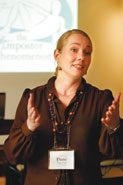Unmasking the imposter phenomenon
Unmasking the imposter phenomenon McGill University
User Tools (skip):
Unmasking the imposter phenomenon
Fear of failure paralyzes students and faculty
Your boss has sparked up a pair of cigars, one for you and one for him. He's just given you a promotion, a raise, the keys to the high profile Diller account, a team of bustling underlings and a hearty slap on the back. "You're going somewhere, Peterson," he grins, chomping on his stogie. "Up, up, up." You, of course, have never felt more doomed. Finally, you think, everyone will find out what a fraud you really are.

Diane Zorn leads the recent Imposter Phenomenon workshop.
Owen Egan
An occasional bout of insecurity isn't necessarily detrimental - for some people, self-doubt is the pointy stick they use to prod themselves to redouble their efforts and, in the end, spur themselves to greater success. But for others, these feelings of inadequacy - even among people with solid records of achievement - are persistent, poisoning their every accomplishment with an overwhelming fear of being found incompetent. Clinicians call it the Imposter Phenomenon (IP) and its effects can be debilitating for everyone from elementary school students to CEOs of multinationals.
According to Diane Zorn, course director in the philosophy department at the Atkinson faculty of liberal and professional studies at York University, institutes of higher learning are particularly fertile breeding grounds for IP. "Scholarly isolation, aggressive competitiveness, disciplinary nationalism, a lack of mentoring and the valuation of product over process are rooted in the university culture," she says. "Students and faculty alike are particularly susceptible to IP feelings."
Zorn has been researching IP in the university setting for almost a decade now. She was recently at McGill to lead an IP workshop graduate students as part of the ongoing PhD support group - a collaborative initiative organized by Jeff Osweiler of Career and Placement Service and Eric Widdicombe of Counselling Service.
Firsthand knowledge
Armed with her own PhD in philosophy, Zorn knows all too well the cycle that IP sufferers must endure. As a student, whenever a paper was due, she would either procrastinate or over-prepare, all the while dreading the evaluation and living with the constant fear of failure. "I would end up crying and deciding to quit," she says. "But I would always say 'I might as well finish this last paper,' hand it in and get an A." The problem, says Zorn, is that this type of cycle becomes almost ritualized, with people believing that they can't succeed unless they follow the same magic recipe of procrastination or over-preparation.
In its most severe form, IP keeps people from advancing in their field. Faculty members with IP offer fewer office hours and don't stay after class so as to avoid answering questions. They also cut down on research activities and shun presenting at conferences. Students zone out, refraining from asking questions or contributing in class discussions. "The worst thing is people with IP do not enjoy their success," says Zorn. "They divert attention away from their skills and abilities and attribute it to having a good supervisor or just being lucky. Ultimately, they lose their original love of their discipline."
Part of the solution is increased mentorship, traditionally strong in programs like education, says Zorn, but sadly lacking in other fields. Graduate students and new faculty alike need to consult with mentors in order to shore up perceived weaknesses to both reduce anxiety and overcome the feeling that they are working in a vacuum. Seminars on IP, like the one held at McGill, also go a long way to alleviating some of the angst. Says Zorn, "There's always a profound sense of relief when people hear that they aren't alone and that they have an actual label for what they are feeling."

